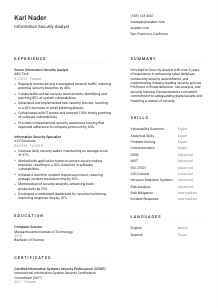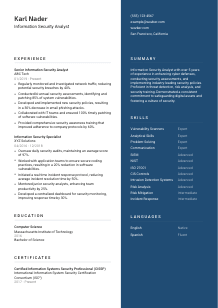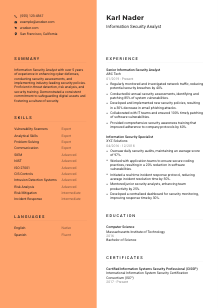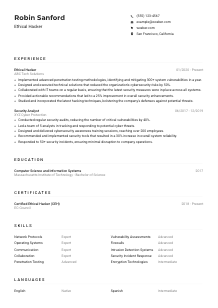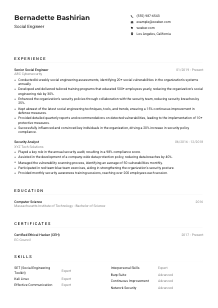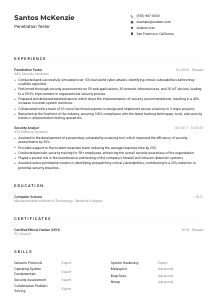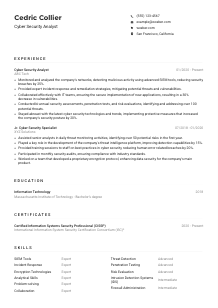Information Security Analyst Resume Example
Securing networks, but your resume feels exposed? Explore this Information Security Analyst resume example, fortified with Wozber free resume builder. See how effortlessly you can encrypt your cybersecurity expertise to align with job protocols, ensuring your career is always at the forefront of digital defense!

How to write an Information Security Analyst resume?
Entering the cybersecurity domain as an Information Security Analyst? Marvelous choice! In our digital era, the role you're aiming to secure is critical and highly sought after. Your resume is not just a piece of paper; it's your entry ticket to this thrilling field.
Imagine melding your skills and experiences into a narrative that captivates hiring managers right from the get-go. With the help of Wozber free resume builder, crafting an ATS-compliant resume that stands out becomes a breeze. Dive deep with us as we tailor a resume for the Information Security Analyst role, making it a fortress of your achievements and skills.
Personal Details
Begin your resume journey by setting the foundation right. Your personal details section is the gateway to introducing who you are. A slight adjustment here, specifically for the Information Security Analyst role, can make a significant impact. Let's explore how to refine this section to ensure you're swiftly identified as the top pick.
1. Name Recognition
Your name is your personal brand; make it memorable. Opt for a font that's professional and clean, ensuring it stands out but remains very easy to read. Imagine your name as the digital signature you'd want on every secured network.
2. Job Title Alignment
Directly below your name, mirror the job title you're applying for. This not only shows your aspiration but also aids in the ATS optimization process. If the job is for an "Information Security Analyst", that's exactly how you should phrase your targeted position on your resume.
3. Essential Contact Details
Ensure your contact information is up to date. A professional email address and a reliable phone number are crucial. Consider this as setting up your two-factor authentication for potential employers to reach you.
4. Location Matters
Given the job's requirement for someone in or willing to relocate to San Francisco, specifying your location as "San Francisco, California" instantly ticks a box in the ATS criteria, making your resume more aligned with the job posting.
5. Online Presence
In a domain as digital as cybersecurity, showcasing your professional online profile or portfolio can give you an edge. Linking to a LinkedIn profile or personal cybersecurity blog demonstrates your engagement in the industry beyond your resume.
Takeaway
The Personal Details section is your handshake in the digital world. Crafting it with precision and professionalism sets the stage for a strong first impression. Keep it clean, relevant, and reflective of the Information Security Analyst role to ensure you pass the initial screening with flying colors.





Experience
The Experience section is where you showcase your battles and victories in the field of cybersecurity. It's not just about listing where you've worked; it's about narrating your journey in securing the digital frontier. Let's decrypt how to construct an experience section that resonates with the requirements of an Information Security Analyst position.
- Regularly monitored and investigated network traffic, reducing potential security breaches by 40%.
- Conducted bi‑annual security assessments, identifying and patching 85% of system vulnerabilities.
- Developed and implemented new security policies, resulting in a 30% decrease in email phishing attacks.
- Collaborated with IT teams and ensured 100% timely patching of software vulnerabilities.
- Provided comprehensive security awareness training that improved adherence to company protocols by 60%.
- Oversaw daily security audits, maintaining an average score of 97%.
- Worked with application teams to ensure secure coding practices, resulting in a 20% reduction in software vulnerabilities.
- Initiated a real‑time incident response protocol, reducing average incident resolution time by 50%.
- Mentored junior security analysts, enhancing team productivity by 25%.
- Developed a centralized dashboard for security monitoring, improving response time by 30%.
1. Job Requirement Breakdown
Initiate by dissecting the job description. Pick out critical responsibilities and required skills such as conducting security assessments, and collaborate with IT teams for patching vulnerabilities. Your goal here is to match these with your accomplishments.
2. Role Structure
Structure your experiences from the most recent, going back. For each role, include your title, the company's name, and the duration worked there. Make it easy for the ATS and the hiring manager to navigate through your career timeline.
3. Accomplishments with Impact
Instead of merely listing duties, present your achievements. Did you enhance cyber security defenses? Reduce security breaches? Quantify your impact where possible, as this makes your contributions tangible and more impressive.
4. Quantitative Triumphs
Whenever you can, add numbers to your achievements. Did your strategies lead to a 40% reduction in potential security breaches? Numbers speak volumes and offer a concrete measurement of your success.
5. Relevance is Key
Concentrate on experiences directly tied to the role of an Information Security Analyst. You might have an array of skills, but prioritizing those aligned with the job, such as risk analysis or security policy development, will make your resume resonate more with hiring managers.
Takeaway
The Experience section is your battlefield. It shows where you've been, what you've conquered, and how you've grown. Align it with the job's requirements, tell a compelling story, and let hiring managers see you as the hero in the cybersecurity saga they need.
Education
Your Educational background is a testament to your foundational knowledge in the realm of cybersecurity. While it might seem straightforward, fine-tuning this section can greatly reinforce your candidacy for the Information Security Analyst role.
1. Highlight Key Requirements
Zero in on the required educational background from the job posting. For our role, a "Bachelor's degree in Computer Science, Information Technology, or related field" is essential. Ensure your education aligns with this requirement.
2. Simplify the Structure
List your degrees in a clear and concise manner, starting with the most recent. For each degree, include the type of degree, your major, the institution's name, and your graduation year. This organization makes it easy for both the ATS and hiring managers to quickly assess your qualifications.
3. Degree Specificity
If your degree directly matches one listed in the job requirements, make it stand out. For example, highlighting a "Bachelor of Science in Computer Science" directly correlates with what the role is looking for, reinforcing your fit for the position.
4. Relevant Courses
Though not always necessary, listing relevant courses can bolster your application, especially if you're entering the field with less experience. Courses in cybersecurity, network security, or ethical hacking are pertinent to an Information Security Analyst.
5. Additional Achievements
Include any honors, clubs, or relevant projects if they demonstrate skills or knowledge applicable to an Information Security Analyst. Did you lead a cybersecurity project in college or participate in a relevant workshop? Such details add depth to your educational background.
Takeaway
The Education section of your resume reflects the groundwork of your expertise in cybersecurity. Make sure it aligns well with the job requirements, presenting you as not just qualified, but exceptionally well-prepared for the Information Security Analyst role.
Certificates
In the ever-evolving field of cybersecurity, certifications serve as badges of honor, showcasing your dedication and proficiency. Let's map out how to present your certifications in a way that aligns with the Information Security Analyst's job requirements.
1. Extract Key Job Requirements
Revisit the job posting. Our Information Security Analyst role does not specify required certifications, meaning this section is your chance to shine and stand out from the crowd. Highlight certifications that are revered in the cybersecurity field.
2. Select Pertinent Certifications
Focus on certifications closely tied to the Information Security Analyst role. A "Certified Information Systems Security Professional (CISSP)" is highly regarded and exhibits a broad knowledge of information security.
3. Transparency with Dates
If a certification has a validity period, make it clear by including the dates. This shows hiring managers that your knowledge is current, which is crucial in a field as dynamic as cybersecurity.
4. Continuous Learning
Cybersecurity is a domain of constant change and challenge. Show your commitment to staying up-to-date by actively pursuing new certifications. This eagerness to learn and adapt is a desirable trait for an Information Security Analyst.
Takeaway
Each certification is a testament to your expertise and dedication to your profession. For an Information Security Analyst, they're evidence of your ability to stay ahead in a competitive and rapidly evolving field. Highlight them with pride and ensure they emphasize your readiness and suitability for the role.
Skills
Your skills section is a compact display of your arsenal in the cybersecurity battleground. It's about more than listing what you're good at; it's about showcasing the specific tools and capabilities you bring to the table. Let's decode the skillset that makes an Information Security Analyst stand out.
1. Analyze the Job Requirements
Start by cross-referencing skills mentioned in the job listing. In our case, proficiency with
2. Align with Necessary Skills
Next, align your proficiencies with those sought in the job description. Mix both technical skills, like risk analysis or security policy development, and soft skills, like problem-solving and effective communication, to show a well-rounded candidate.
3. Keep It Streamlined
While you might be tempted to list every skill you possess, focus on the most relevant ones for the Information Security Analyst role. This targeted approach does not overwhelm the hiring manager and keeps your resume aligned with the job's needs.
Takeaway
Crafting a skills section that's both compelling and tailored is key to passing the ATS scan and captivating the hiring manager's interest. Highlight the skills that make you an unbeatable candidate for the Information Security Analyst role, painting a clear picture of your professional toolkit.
Languages
In a globally connected cyber world, your linguistic skills can be a unique asset. Even if not explicitly required, being multilingual can enhance your appeal as an Information Security Analyst. Here's how to optimize your Languages section for an international cybersecurity career.
1. Check for Language Requirements
First, identify if the job listing has any language prerequisites. For this role,
2. Additional Languages
If you're fluent in languages beyond the required English, list them too. This can set you apart in the global field of cybersecurity, demonstrating your ability to collaborate with international teams or clients.
3. Honest Proficiency
Be honest about your language proficiency levels. Whether you're native, fluent, or intermediate, accurate representation of your abilities shows integrity and helps set realistic expectations for your role in a multinational environment.
4. Consider the Role's Scope
Cybersecurity is borderless. If the role involves dealing with global threats or requires coordination across different regions, having additional languages can significantly boost your candidacy.
5. Global Mindset
Highlighting your language skills, even if not directly required, reflects a global mindset and cultural adaptability - essential traits for facing international cybersecurity challenges.
Takeaway
In an interconnected world, your ability to communicate across borders can be a distinguishing factor. Whether required or not, showcasing your linguistic skills can demonstrate your readiness for the global aspects of the Information Security Analyst role. Let your resume speak volumes about your ability to secure networks worldwide.
Summary
Your summary is the executive briefing of your career. It's your chance to present yourself as the cybersecurity expert that companies need. Tailoring this section to meet the specific demands of an Information Security Analyst position can set the stage for your entire resume.
1. Capture the Job's Essence
Digest the job description to understand the core of what's being sought. Highlight your ability to monitor network traffic, conduct security assessments, and develop security policies, aligning with the major responsibilities of the role.
2. Start with Your Pitch
Kick off with a sentence that introduces you: an experienced and competent Information Security Analyst deeply familiar with the intricacies of cyber defense mechanisms, threat detection, and risk analysis.
3. Highlight your impact
Mention a few key skills and accomplishments that directly relate to the role. Maybe you've successfully reduced breaches by a significant percent, or you're proficient in the most sought-after security tools and frameworks. Make it count.
4. Conciseness is Key
While you're encapsulating your professional journey, remember to keep it succinct. Aim for 3-5 compelling lines that invite hiring managers to read on, excited to discover how you can protect their digital assets.
Takeaway
Your summary is the frontline of your resume, making a bold statement about your capabilities and readiness for the Information Security Analyst position. It sets the tone, establishes your expertise, and invites deeper exploration into your professional narrative. Craft it with the precision of a cybersecurity expert, and you're sure to catch the hiring manager's eye.
Embark on Your Information Security Analyst Adventure
Kudos for navigating through this detailed guide! Armed with these insights, you're now ready to construct a resume that doesn't just pass through ATS filters but also captivates the attention of hiring managers. Remember, the digital landscape awaits your expertise.
With your finely tuned resume powered by Wozber's free resume builder, ATS-friendly resume templates, and ATS resume scanner, you're not just stepping into the role of an Information Security Analyst; you're securing your future. Embrace your unique journey, let your resume be the beacon that guides you to your next career milestone, and prepare to make an indelible mark in the world of cybersecurity.

- Bachelor's degree in Computer Science, Information Technology, or related field.
- Minimum of 3 years of experience in information security or related roles.
- Proficiency with common security tools, including vulnerability scanners, SIEM, and intrusion detection systems.
- In-depth knowledge of security frameworks such as ISO 27001, NIST, or CIS Controls.
- Strong analytical and problem-solving skills with the ability to communicate effectively with technical and non-technical stakeholders.
- Must be able to communicate effectively in English.
- Must be located in or willing to relocate to San Francisco, CA.
- Regularly monitor and investigate network traffic for potential security breaches or threats.
- Conduct periodic security assessments and risk analysis to identify vulnerabilities.
- Develop and implement security policies, protocols, and procedures to safeguard digital files and information systems.
- Collaborate with IT teams to ensure timely patching of software and hardware vulnerabilities.
- Provide on-going security awareness training to staff to ensure adherence to company security protocols.





